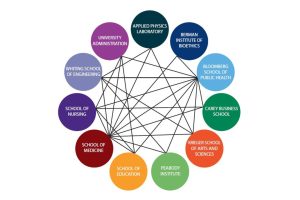Michael Tsapatsis joined Johns Hopkins in 2018 as the university’s 36th Bloomberg Distinguished Professor. He received an Engineering Diploma (1988) from the University of Patras, Greece, and MS (1991) and Ph.D. (1994) degrees from the California Institute of Technology (Caltech) working with G.R. Gavalas. He was a postdoctoral fellow with M.E. Davis at Caltech (1993/94). Before joining Johns Hopkins, he was a faculty member in the Department of Chemical Engineering and Materials Science at the University of Minnesota (2003-2018), where he held the Amundson Chair and the McKnight Presidential Endowed Chair. He started his academic career as a faculty member in the Chemical Engineering Department at the University of Massachusetts Amherst (1994-2003).
His teaching interests are reaction engineering, catalysis, separations, transport phenomena, and process and product design with an emphasis on energy efficiency and process intensification. In his research, Tsapatsis combines principles of reaction engineering, mathematical modeling, and materials science with the long-term goal of making industrial production of chemicals both cleaner and more energy efficient. His research group is designing, synthesizing, and testing materials that will achieve these objectives while remaining low-cost, reliable, and efficient to meet a chemical plant’s production needs when brought to scale. The group is also targeting the development of new chemical pathways, including those for the production of chemicals from renewable sources.
At the fundamental level, Tsapatsis is interested in hierarchical multi-functional materials design based on molecular engineering, and control of nucleation, directed assembly, and crystal growth at the molecular and nanometer level. Tsapatsis’ group research is highly collaborative and interdisciplinary. It is strengthened by collaborations with experts in high-resolution imaging, computational chemistry, and process synthesis/design/optimization to achieve specific reaction engineering goals and to advance the frontiers of materials science and inorganic chemistry. Examples of breakthroughs accomplished by his research team and extensive network of collaborators in academia and national laboratories is the discovery of zeolite nanosheets (extremely thin silicate crystals with molecular-sized pores) and their use as thin film ultra-selective separation membranes (Science 334, 72-75 (2011) and Nature 543(7647), 690-694 (2017)) and catalysts (Science 336, 1684-1687 (2012)), and the development of a manufacturing method for thin film metal-organic-framework (MOF) membranes (Science 361, 1008-1011 (2018)). Research in his group is also strengthened by substantial industrial interactions and Tsapatsis is co-inventor in several patents and pending patent applications.
He is the recipient of the Alpha Chi Sigma Award for Chemical Engineering Research from AIChE, the Breck Award from the International Zeolite Association, the Charles M.A. Stine Award from the Materials Engineering & Sciences Division of AIChE, a David and Lucile Packard Foundation Fellowship, a National Science Foundation CAREER Award, a Camille Dreyfus Teacher-Scholar Award, and a North American Membrane Society Fellowship. He was elected fellow of the American Association for the Advancement of Science (2011) and a member of the National Academy of Engineering (2015).



